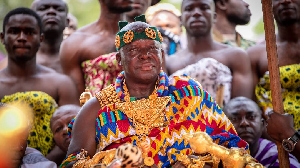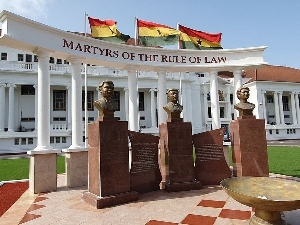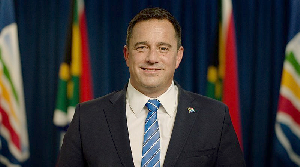Opinions of Sunday, 6 March 2011
Columnist: Codjoe, Theophilus A.
President John Attah Mills May Redeem His Name .....
After All With The Constitutional Review Commission Initiative.
It has been reported in the Ghana web “General News of Monday 21, Feb. 2011”,that:
“A number of respondents to an Institute of Economic Affairs [IEA] Constitution Review Survey, have called for the establishment of a mandatory long term National Development Planning Framework devoid of party politics.
About 91 per cent of the respondents agreed to the proposition for the establishment of an NDP framework which must be entrenched and become mandatory for all goverments……” The same source also reported : “On the extent of corruption and accountability under the Fourth Republic, the IEA survey Revealed that as high as 83 percent of the respondents were of the view that corruption was high…………..
Up to 32 per cent of the respondents thought that the mandatory declaration of assets by Public officials within stipulated time could not help reduce the high incidence of corruption
among the personnel”
The realization by Ghanaians that certain provisions of the 1992 Constitution have been rendered ineffective, ignored, or sometimes even deliberately violated by our politicians in the last eighteen years of constitutional rule, as a result of which they have not been able to hold their politicians accountable, has been brought out sharply by the proceedings at the various sessions of the Constitutional Review Commission. The list of the Top 25”issues that the CRC has found is uppermost in the minds of Ghanaians with respect to the proposals for consideration bear out this realization. The “Top 25 “ issues include the payment of ex gratia and gratuity to politicians, the establishment of an Independent National Prosecuting Office ,the initiating and execution of legislation with financial implications by all members of parliament, the election of local government officials as against their appointment by the President of Ghana and the empowerment of accountability institutions to be able to prosecute persons they find accountable for violations of relevant laws, without reference to the Attorney –General . The issue of the proposal to reform of the National Development Planning Commission though not the most important issue in terms of accountability, [accountability issues seem to me to be more important] has received a higher profile in terms of publicity, it seems, because of the political profiles of the persons who have been publicly advocating it. Mr. P. V. Obeng’s role in the leadership of the PNDC was comparable to that of a Prime Minister in the British system; in the Ghana of the 1980s he was even more powerful, since there were none of the legal controls on the exercise of power that the Prime Minister of the UK has to contend with. In that position he had the power to shape out, to begin the process of establishing the type of National Development Planning Commission that he is now advocating. One of the authors of the IEA’s Constitutional Review Survey report from which the quotations above were taken, Mr. Kwamena Ahwoi, was arguably the foremost jurist of the PNDC ‘Revolution”, and certainly one of the originators of the ideas behind the political power architecture of the 1992 Constitution. In terms of the participation of the citizens of Ghana in the economic and political development of Ghana ,as conceptualized by the PNDC he was one of the originators of the main ideas, as well as the brain behind the judicial structures established by the PNDC. Finally in terms of the ideas which shaped the PNDC’s and the NDC’s government at the local level, no one can claim more responsibility than him. As the Minister For Local Government for a long time he upheld and put into practice the Constitutional provisions relating to the political base of our local government structure which are now under attack. And then there is the President Professor Atta Mills himself; admittedly he did not share the enthusiasm of his other law professor colleagues for the daring Flight Lieutenant who had provided an opportunity for the implementation of a radical development programme for Ghana; but he had accepted the call to partner the then President Rawlings for the top executive position in 1996; he had four years to advise on the workings of the National Development Planning Commission but we know nothing of the initiatives if any ,on his part to make the National Development Planning Commission more effective.
The question which arises then is this: if Mr. P.V.Obeng and Mr Kwamena Ahwoi, powerful politicians from 1982 until 1996 when Prof Mills joined them, and then on to 2000,hadmuch much greater opportunities then, to institute what they are advocating today ,why did they not do it?
On the issue of the incidence of corruption and the persistent lack of enforcement of the provisions for ensuring accountability of political public office holders in the last sixteen or so years of constitutional rule the same question can be asked: Why did a regime in which some Ghanaians lives were sacrificed in a process to wipe out corruption in public office from Ghana once and for all time, leave behind a legacy so rich in corruption and lack of accountability?
I contend that the answer to both questions is Mr. Jerry John Rawlings. The 1992 Constitution was constructed to ensure that Rawlings would remain leader of Ghana for another eight years [after ten years of the PNDC] with the new constitution, by which time it was hoped, the political classes he had overthrown in 1982 had no resources or the will to come back to claim political and economic power in Ghana. This basic objective was secured by the provisions which Ghanaians find objectionable in the Constitution today, which are: 1.that the former President Rawlings cannot be held accountable for overthrowing the 1979 Constitution [the indemnity clauses and the provisions keeping the national criminal prosecuting authority with only the President’s appointee, the Attorney- General ;[ remember Rawlings had created an Office Of Special Public Prosecutor ,independent of the Attorney -General, during his PNDC era]; 2. that no opposition members of Parliament can deal in matters of finance in a way that may involve them in the “secrets’ of government finances; [the provision that only the President can initiate legislation which has cost implications to the national treasury]; 3. that no opposition party members may get into any political decision making positions ; [the provision that local government executives are appointed by the President and not elected; 4. that no decisions of the highest court in the land may frustrate a political decision or legislation that is aimed at keeping opposition party members out of power; [ the provision leaving the number of Supreme Court Justices, open] etc,; It is clear that these provisions were intended to ensure that politicians opposed to the PNDC regime would have to wait a long time to come back to political office in Ghana and when they did, it would take a significant amount of time to dismantle these provisions before they could ,if they still desired, to hold Rawlings accountable. And this grand plan has paid off at least for sixteen years. Thanks to the ex- President Kufour ,a mild National Reconciliation process has taken the mind of Ghanaians off a real attempt to challenge the indemnity clauses. Again, it has been one of the characteristics of politics in Ghana that when a new administration takes over from a previous one, their priorities do not include a review of the problems encountered in the operation of the Constitution; the defects of the 1992 Constitution in, for example, the transition processes for the new administration to take over from the old one. Mr. Kuffuor’s National Reconciliation Committee was to correct wrongs which had made victims of some Ghanaians; he was not interested in making constitutional changes for the benefit of Ghana; indeed he also took advantage of those provisions to make it impossible to hold him and his officers accountable, and also to make his control of the state institutions difficult to challenge. The manner in which he has taken advantage of the ex-gratia clauses is a good example of this tendency.
The manner in which provisions of the 1992 Constitution were instituted to secure for Mr. Rawlings a future free from being held accountable for his rule over Ghana from 1982 till 1992, was a total departure from the professed principles of the integrity and accountability crusade of the PNDC. In many instances the Constitutional provisions secured Mr. Rawlings’s future were a regression from the PNDC Laws decreed to counter corruption in public office. So why is the President Mills taking this rather revolutionary line of action, in comparison to Kuffour and indeed in opposition to his mentor and political forebear Mr. Rawlings, and against the power brokers of his own Party ,the NDC? There is no doubt in my mind that President Mills’ decision and action to review the 1992 Constitution was dictated by what he sees as the need to free Ghana from the debilitating hold of our politicians of the last sixteen years, which includes himself and his party’s founders. If the amendments to the Constitution which are currently being canvassed are indeed finally incorporated in the Constitution, a new era of political accountability will be opened and Ghanaians will participate in a bigger political space which will be opened on the national and the local administrations fronts. Take the idea of the Independent National Prosecutor’s Office for instance; it will save any President having to deal with the difficult problem of getting his own political public officers investigated and possibly prosecuted for violations of the laws, if he really meant to do so. The best proof of this contention has been fortuitously delivered to us by the Wikileaks cables from the US Embassy in Ghana where it is reported that President Mills actually asked the US Embassy officials to investigate his officials whom he suspected of drug smuggling through the Kotoka International Airport. When a President of a country cannot order his law enforcement officers to take action against his own political officers, [because they are the bigwigs to whom obligations are owed], how can he enforce the rule of law? Or when the former President from the sitting President’s own party accuses him of failing to have alleged law breakers of the previous administration prosecuted, can he blame his own Attorney –General? The President can however refer such cases to an independent National Prosecutor and thus avoid charges of ‘political’ prosecutions. Law enforcement officers like the Police will not be afraid of arresting any footsoldiers breaking the law because the National Prosecutor’s office will have the duty to justify the prosecutions. An Independent National Prosecutors office, working blind to the political colour of the accused will be a relief to any President of Ghana who is plagued with allegations of failure to ensure the prosecution of politicians from both his party and the opposition party for alleged criminal offences! This provision will, in addition to the other provisions under discussion at the Review Commission give the President some political space; a President who wants to serve Ghana first before his party will have that space free from his party’s bondage. In the case of President Mills he will escape from the debilitating pressures of the Rawlingses! It would appear a heresy to imply that President Mills’ initiative to rid the 1992 Constitution of the provisions I contend were made to cater for Mr. Rawlings’ agenda and not Ghana’s, is also a means of freeing his administration of the pressures of the Rawlingses; this however is a very credible implication, if the facts and current circumstances of the Rawlingses are considered; and what are those facts and circumstances? They are, 1. The Rawlingses need political power to ensure their security from any possible movement in Ghana to hold them accountable for some of the violations of law in Ghana that occurred during the PNDC era. There are still some Ghanaians who clamour for the abolition of the indemnity clauses. For Mrs Konadu Rawlings, not so much indemnity from the overthrow of the 1979 Constitution, but remember, she was facing criminal charges in a High Court in Ghana in 2008 in relation to an alleged fraudulent appropriation of the assets of the Nsawam Cannery Company. She is currently “free’ of those charges only because of then President Kuffour’s pardon, but the legitimacy of that pardon is doubtful. I am sure constitutional lawyers in Ghana will debate that pardon if the time comes; we know that Mr. Tsatsu Tsikata who himself was granted a pardon by the ex-President in similar circumstances refused it, questioning its good faith. So there are very real reasons why the Rawlingses cannot afford to retire now from Ghanaian politics and not be concerned with the acts of a new NDC President, some of whose staff have shown open hostility to the Rawlingses and their employees, people like Kofi Adams. Now that it has become clear to the Rawlingses that President Mills cannot be relied upon to let them have a significant hand in this NDC administration, Mrs Rawlings has thrown in the gauntlet and declared her intention to contest in the next race for the flag bearership of the NDC ! I do not mean to suggest here that President Mills wants Mr. Rawlings or his wife in prison or out of Ghana in exile; like many of us who served as public officers appointed by the PNDC, and did not break any laws, working honestly and faithfully to assist the progress of Ghana, the overthrow of the 1979 Constitution is a part of our political history and any revisionist version of that event which will attempt to criminalise genuine political acts aimed at assisting the development of Ghana will be unacceptable, and legally resisted for the good of Ghana. All that President Mills wants is to remove those Constitutional provisions which were obviously created to keep out of Ghanaian politics the politicians who were opposed to the 1992 coup [we must uphold their right to oppose the coup; after all it was a violation of our constitution at the time; and it was patriotic effort even though they did not succeed in their aim; people like Kwame Pianim must today be awarded medals ;though they opposed Rawlings as a coup maker, their opposition was an act of patriotism at the time],but which provisions are now outdated and hindering our development. In that sense if the Constitutional Review results in changes to the way our politics are conducted in this country for the general good, Mills would have earned a place in the history of Ghana. He would be remembered, if for nothing at all, I believe, as the politician who took our 1992 Constitution forward by introducing new provisions that made political activity yield benefits for all Ghanaians not only for those in control of the government administration.
A second important issue that this Constitutional Review brings up is whether our politicians of the last sixteen years have done their duty to Mother Ghana, with all the financial benefits and material priviledges that Ghanaians have sacrificed to bestow on them. The issues in the Review Committees “Top 25 List” should have been obvious to all of them, especially most of the NPP legal brains. Most Ghanaianas who were aware that the 1992 Constitution had these deficits, thought that as imperfect as it was, it was the nation’s best option, at the time, to return to Constitutional rule. We had an NPP opposition in Parliament from 1996 at least voices should have begun to be raised about the need to begin a review process; the NDC would of course , have opposed that move but then a Proposal For Review from the NPP opposition ,setting out the provisions which might be amended should have been produced and introduced to the public. Are to conclude then that the NPP, beyond the National Reconciliation exercise was satisfied with the Constitution? If they were not and have waited all this time to contribute to this review initiative then has President Miils not shown more statesmanship in this matter? Again were our Parliamentarians of the past sixteen years public officers of a higher level than the career public servants [whose conditions of service they want to appropriate by the back door]? If you consider that the Constitution is the first law of the land, by which all the other laws made by the Parliament are to be measured, then is it not amazing that for sixteen years our Parliamentarians made laws under this Constitution without noticing the deficits or if they did why did we not see their reactions? I have asked the above questions rhetorically to highlight this major failure of our Parliamentarians. In fact however the answers to these questions are readily available. The answer is that our Parliamentarians, of all party colours, have entered into a conspiracy of silence, and ironically, Mr. Rawlings, not to undo these provisions. Mr. Rawlings security from challenges to his political standing in Ghana, secured by these provisions has turned out, to be their security from being held accountable by the electorate. An examination of some of the provisions in the “Top 25 List” and other provisions I have found during my own researches will demonstrate my contention:
1. EX GRATIA AWARDS: The MPs approval of the President’s ex gratia was contigent upon the President’s prior approval of theirs; of course poor President Mills did not know this and Mr. Asaaga had to suffer for his colleagues;
2. THE NUMBER OF MINISTERS APPOINTED BY THE PRESIDENT: Since it appears that almost every MP desires to be appointed a Minister of State, or failing that ,a Deputy Minister of State, why would an MP seek a law to curtail the Presidents power to appoint as many Ministers as he wishes to support his policies?; 3. THE MAJORITY OF MINISTERS APPOINTED FROM THE PARLIAMENT: We know that MPs feel they are better in human quality than every other Ghanaian; [we cannot even make judgements on their performance] so why would they change a provision which allows the President to appoint more ministers from their ranks? Again for the President, having a majority of his cabinet appointed from the Parliament means he has more high profile party members to defend his policies;
4. THE PRESIDENT CANNOT BE INVESTIGATED OR PROSECUTED FOR ANY CRIMES WHILE IN OFFICE &THE MINISTER OF JUSTICE AND ATTORNEY-GENERAL APPOINTED BY THE PRESIDENT HAS A MONOPOLY ON THE PROSECUTION OF CRIMINAL CASES: The President is secure from prosecution and the A-G cannot prosecute any MP if the President does not want it; if the A-G, in a most unlikely event, attempts to prosecute any MP [or indeed anybody at all] when the President does not want that, the A-G may be dismissed by the President;
5. ONLY THE PRESIDENT CAN PROPOSE A BILL WITH COST IMPLICATIONS TO PARLIAMENT FOR PASSAGE INTO LAW: The President does not want any opposition member of Parliament to obtain national resources to improve his or her constituency thus taking some credit for the progress of his constituency etc; MPs may like the idea of not having to do the often difficult work of initiating a law, steering it through the processes of Parliament and ensuring that it is passed into law; 6.APPOINTMENT OF DISTRICT,MUNICIPAL AND METROPOLITAN CHIEF EECUTIVES BY THE PRESIDENT INSTEAD OF BY ELECTIONS: The President wants absolute control of all levels of government administration in the country ;he does not want any opposition politicians in any of these government agencies to take the credit for any development;[he may not want even members of his own party who oppose him ,such as Mr. P .C. Appiah Ofori to head a District or municipal assembly!]]; for the MPs who belong to the President’s party having their own party member as head of the district administration, ensures that when they visit the district they have all the facilities of the State that are available to the District government representative, such as luxury cars guest houses, petrol, etc; during the general elections they enjoy these facilities when they defend their constituency seats;
7. THE CODE OF CONDUCT FOR PUBLIC OFFICERS UNDER CHAPTER TWENTY-FOUR,WHICH CONTAIN THE PROVISIONS FOR THE DECLARATION OF ASSETS BY PUBLIC OFFICERS HAS NOT BEEN ENFORCED AT ALL : Even though President Mills on record as having called upon his ministers to declare their assets, his call is not law, and so his ministers and other political public officers may ignored his call thus breaking the law; as the law stands now no public officer or any public agency seems empowered to enforce it, making it seem that the law, in principle cannot assist in curbing corruption; if the law is amended to give it teeth as when an enforcement agency is instituted to properly enforce it ,it will make an impact. Our politicians of the past eighteen years, both government administrations and oppositions politicians however, have refused to give it that bite, because of course, they do not want to be held accountable by the people of Ghana; 8. The following provisions I found during my own research to have been ignored by our politicians;[I have submitted recommendations on some of them to the Constitutional Review Commission for consideration ]: a. POLITICAL PARTIES ARE TO DECLARE TO THE PUBLIC THEIR REVENUES AND ASSETS AND THE SOURCES OF THOSE REVENUES AND ASSETS AND TO PUBLISH TO THE PUBLIC ANNUALLY THEIR PUBLIC ACCOUNTS: This is a rendition of Article 55[14] [a] and [b] of the 1992 Constitution; clearly our politicians have not found it important enough to obey it. To me and to many other Ghanaians this is another proof that our politicians cannot be genuine statesmen of Ghana worthy of their “Honourable” appellations; respect for the provisions of the basic law of Ghana must be their first duty to Ghanaians, even when they deem those provisions affecting their private interests adversely;
b. THE 1992 CONSTITUTION REQUIRES OUR POLITICIANS WHEN IN OFFICE TO PASS LAWS THAT WILL ENSURE THAT GHANAIANS HAVE ACCESS TO INFORMATION ABOUT GOVERNMENT WORK AND POLICIES ETC,WHAT IN MODERN DEMOCRACIES IS KNOWN AS A FREEDOM OF INFORMATION ACT : This contention is the clear intention of provisions under the “Fundamental Human Rights And Freedoms” under Chapter Five, and “The Directive Principles Of State Policy” under Chapter Six, of the 1992 Constitution. Article 21 provides: “[1] All persons shall have the right to----- ……………………………………………………. [f] information, subject to such qualification and laws as are necessary in a democratic society; Article 37[2] provides:
“[2] The State shall enact appropriate laws to assure ------ [a] the enjoyment of rights of effective participation in development processes including rights of people to form their own associations free from state interference and to use them to promote and protect their interests in relation to development processes, rights of access to agencies and officials of the State necessary in order to realize effective participation in development processes; Article 41 provides: “41.The exercise and enjoyment of rights and freedoms is inseparable from the performance of duties and obligations, and accordingly, it shall be the duty of every citizen----------- ……………………………………………………………………..
[f] to protect and preserve public property and expose and combat misuse and waste of public funds and property;
In my opinion, these provisions clearly compel our politicians to pass laws that provide access to information about government business, subject of course to the limitations provided by the Constitution. Again out politicians have, in this case, refused to pass a Freedom Of Information Act despite very loud calls by the public. One of the President’s advisers recently declare publicly that the government will “give “ Ghanaians a Freedom Of Information Act according to the government’s own schedule because “after all we promised it in our manifesto”. Well the government should know better; a Freedom Of Information Act is a demand from the 1992 Constitution, and if they are statesmen and not just politicians, they would want to pass that act now.
But a Freedom Of Information Act aside, it is my opinion that President Mills for having dared all those politicians before him in the 4th Republic and initiated a review of the 1992 Constitution has come very close to joining the past real statesmen of Ghana and probably Ghanaians should begin to review their assessment of him as merely a token President with no political mission on his own mind.
THEOPHILUS A. CODJOE, Rokkashomura, North Japan, Tuesday, March 01, 2011.












